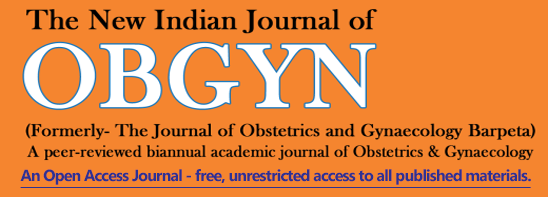
The New Indian Journal of OBGYN. Epub Ahead of Print
The burden of postnatal depression and perceived stress in mothers – what do we observe and learn?
Heera Shenoy T, Remash K, Sheela Shenoy T
ABSTRACT
Background: Stress and depression, occurring together during pregnancy, can have seriously adverse outcomes on the mother, the foetus and her newborn. It can lead to low birth weight, preterm births and foetal growth restriction on the one hand and neuro-psychological effects such as anxiety during pregnancy and puerperium on the other. Objectives: This research was aimed at analysing the determinants of both depression and stress, using Edinburgh Postnatal Depression Scale (EPDS) and Perceived Stress Scale (PSS) among postnatal women in Kerala. Methods: A total of 119 women between 2 to 6 weeks of postpartum period were subjected to 10-point EPDS and PSS questionnaires. Screening and diagnosis of postpartum stress were based on Perceived Stress Scale (PSS), and graded as ‘mild’ (0-13), ‘moderate’ (14-26) or ‘severe’ (27-40). EPDS >13 was used to screen the patients with depressive symptoms. Results: The proportion of mothers with moderate depression and stress was 26.05% Young age at marriage (p value-0.013), love marriage (p value-0.05), low self-esteem (p value - 0.001), and inadequate relationship with the in-laws (p value-0.001) and parents were strong predictors. The gestational age at delivery was 1.17 weeks earlier in PND mothers which was statistically significant and babies born to these mothers weighed 228 grams lighter than non-depressed mothers. The gender of the newborn, fear of and/or preference for a particular gender and order of female child in multiparous woman had no association in determining postnatal stress and PND. Mothers with childcare stress (p value - 0.002), familial and personal history of depression and psychiatric illness (p value - 0.001) had greater chances of developing PND and stress. Conclusions: Gestational age at birth and caesarean delivery were significant determinants. Women with low self- esteem and poor support from family had the risk of developing depression. Therefore it is recommended that PND screening should be an integral part of postnatal care. Mothers with a history of depressive illness need to be screened early in antenatal period. Timely detection should be made and adequate counselling offered to the mothers who are screened positive.
Volume 1 Issue 2
Volume 2 Issue 1
Volume 2 Issue 2
Volume 3 Issue 1
Volume 3 Issue 2
Volume 4 Issue 1
Volume 4 Issue 2
Volume 5 Issue 1
Volume 5 Issue 2
Volume 6 Issue 1
Volume 6 Issue 2
Volume 7 Issue 1
Volume 7 Issue 2
Volume 8 Issue 1
Volume 8 Issue 2
Volume 9 Issue 1
Volume 9 Issue 2
Volume 10 Issue 1
Volume 10 Issue 2

